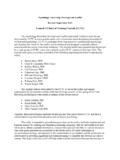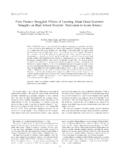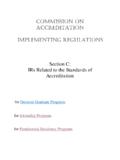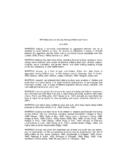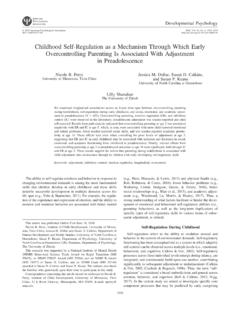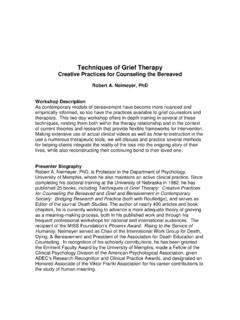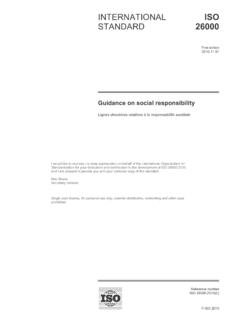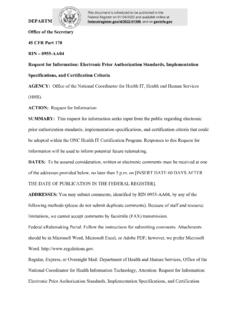Transcription of Ethical PrinciPlEs of Psychologists and codE of conduct
1 Ethical PrinciPlEs of Psychologists and code of conductAdopted August 21, 2002 Effective June 1, 2003 With the 2010 AmendmentsAdopted February 20, 2010 Effective June 1, 2010 Effective June 1, 2003, as amended 20101 Copyright 2010 by the American Psychological Association. 0003-066 XEthical PrinciPlEs of Psychologists and code of conductCONTENTSINTRODUCTION AND APPLICABILITYPREAMBLEGENERAL PrinciPlEs Principle A: Beneficence and Nonmaleficence Principle B: Fidelity and Responsibility Principle C: Integrity Principle D: Justice Principle E: Respect for People s Rights and DignityETHICAL STANDARDS 1. Resolving Ethical Issues Misuse of Psychologists Work Conflicts Between Ethics and Law, Regulations, or Other Governing Legal Authority Conflicts Between Ethics and Organizational Demands Informal Resolution of Ethical Violations Reporting Ethical Violations Cooperating With Ethics Committees Improper Complaints Unfair Discrimination Against Complainants and Respondents2.
2 Competence Boundaries of Competence Providing Services in Emergencies Maintaining Competence Bases for Scientific and Professional Judgments Delegation of Work to Others Personal Problems and Conflicts3. Human Relations Unfair Discrimination Sexual Harassment Other Harassment Avoiding Harm Multiple Relationships Conflict of Interest Third-Party Requests for Services Exploitative Relationships Cooperation With Other Professionals Informed Consent Psychological Services Delivered to or Through Organizations Interruption of Psychological Services4. Privacy and Confidentiality Maintaining Confidentiality Discussing the Limits of Confidentiality Recording Minimizing Intrusions on Privacy Disclosures Consultations Use of Confidential Information for Didactic or Other Purposes5. Advertising and Other Public Statements Avoidance of False or Deceptive Statements Statements by Others Descriptions of Workshops and Non-Degree-Granting Educational Programs Media Presentations Testimonials In-Person Solicitation6.
3 Record Keeping and Fees Documentation of Professional and Scientific Work and Maintenance of Records Maintenance, Dissemination, and Disposal of Confidential Records of Professional and Scientific Work Withholding Records for Nonpayment Fees and Financial Arrangements Barter With Clients/Patients Accuracy in Reports to Payors and Funding Sources Referrals and Fees7. Education and Training Design of Education and Training Programs Descriptions of Education and Training Programs Accuracy in Teaching Student Disclosure of Personal Information Mandatory Individual or Group Therapy Assessing Student and Supervisee Performance Sexual Relationships With Students and Supervisees8. research and publication institutional approval Informed Consent to research Informed Consent for Recording Voices and Images in research Client/Patient, Student, and Subordinate research Participants Dispensing With Informed Consent for research Offering Inducements for research Participation Deception in research Debriefing Humane Care and Use of Animals in research Reporting research Results Plagiarism publication Credit Duplicate publication of Data Sharing research Data for Verification Reviewers9.
4 Assessment Bases for Assessments Use of Assessments Informed Consent in Assessments Release of Test Data Test Construction Interpreting Assessment Results Assessment by Unqualified Persons Obsolete Tests and Outdated Test Results Test Scoring and Interpretation Services Explaining Assessment Results Maintaining Test Security10. Therapy Informed Consent to Therapy Therapy Involving Couples or Families Group Therapy Providing Therapy to Those Served by Others Sexual Intimacies With Current Therapy Clients/Patients Sexual Intimacies With Relatives or Significant Others of Current Therapy Clients/Patients Therapy With Former Sexual Partners Sexual Intimacies With Former Therapy Clients/Patients Interruption of Therapy Terminating Therapy2010 AMENDMENTS TO THE 2002 Ethical PrinciPlEs Of Psychologists AND code Of conduct 2 Effective June 1, 2003, as amended 2010 Introduction and Applicabilityportunity for an in-person hearing.
5 But generally provide that complaints will be resolved only on the basis of a submitted Ethics code is intended to provide guidance for Psychologists and standards of professional conduct that can be applied by the APA and by other bodies that choose to adopt them. The Ethics code is not intended to be a basis of civil liability. Whether a psychologist has violated the Ethics code standards does not by itself determine whether the psy-chologist is legally liable in a court action, whether a contract is enforceable, or whether other legal consequences modifiers used in some of the standards of this Ethics code ( , reasonably, appropriate, potentially) are in-cluded in the standards when they would (1) allow profes-sional judgment on the part of Psychologists , (2) eliminate injustice or inequality that would occur without the modifier, (3) ensure applicability across the broad range of activities conducted by Psychologists , or (4) guard against a set of rigid rules that might be quickly outdated.
6 As used in this Ethics code , the term reasonable means the prevailing professional judgment of Psychologists engaged in similar activities in sim-ilar circumstances, given the knowledge the psychologist had or should have had at the American Psychological Association s Council of Representatives ad-opted this version of the APA Ethics code during its meeting on August 21, 2002. The code became effective on June 1, 2003. The Council of Represen-tatives amended this version of the Ethics code on February 20, 2010. The amendments became effective on June 1, 2010 (see p. 15 of this pamphlet). Inquiries concerning the substance or interpretation of the APA Ethics code should be addressed to the Director, Office of Ethics, American Psycho-logical Association, 750 First Street, NE, Washington, DC 20002-4242. The Ethics code and information regarding the code can be found on the APA website, The standards in this Ethics code will be used to adjudicate complaints brought concerning alleged conduct occur-ring on or after the effective date.
7 Complaints will be adjudicated on the basis of the version of the Ethics code that was in effect at the time the conduct APA has previously published its Ethics code as follows:American Psychological Association. (1953). Ethical standards of psycholo-gists. Washington, DC: Psychological Association. (1959). Ethical standards of psycholo-gists. American Psychologist, 14, 279 Psychological Association. (1963). Ethical standards of psycholo-gists. American Psychologist, 18, 56 Psychological Association. (1968). Ethical standards of psycholo-gists. American Psychologist, 23, 357 Psychological Association. (1977, March). Ethical standards of Psychologists . APA Monitor, 22 Psychological Association. (1979). Ethical standards of psycholo-gists. Washington, DC: Psychological Association. (1981). Ethical PrinciPlEs of psycholo-gists.
8 American Psychologist, 36, 633 Psychological Association. (1990). Ethical PrinciPlEs of psycholo-gists (Amended June 2, 1989). American Psychologist, 45, 390 Psychological Association. (1992). Ethical PrinciPlEs of psycholo-gists and code of conduct . American Psychologist, 47, 1597 Psychological Association. (2002). Ethical PrinciPlEs of psycholo-gists and code of conduct . American Psychologist, 57, copies of the APA s Ethical PrinciPlEs of Psychologists and code of conduct from the APA Order Department, 750 First Street, NE, Washing-ton, DC 20002-4242, or phone (202) AND APPLICABILITYThe American Psychological Association s (APA s) Ethical PrinciPlEs of Psychologists and code of conduct (hereinafter referred to as the Ethics code ) consists of an In-troduction, a Preamble, five General PrinciPlEs (A E), and specific Ethical Standards.
9 The Introduction discusses the intent, organization, procedural considerations, and scope of application of the Ethics code . The Preamble and General PrinciPlEs are aspirational goals to guide Psychologists toward the highest ideals of psychology. Although the Preamble and General PrinciPlEs are not themselves enforceable rules, they should be considered by Psychologists in arriving at an Ethical course of action. The Ethical Standards set forth enforceable rules for conduct as Psychologists . Most of the Ethical Stan-dards are written broadly, in order to apply to Psychologists in varied roles, although the application of an Ethical Standard may vary depending on the context. The Ethical Standards are not exhaustive. The fact that a given conduct is not specifically addressed by an Ethical Standard does not mean that it is nec-essarily either Ethical or Ethics code applies only to Psychologists ac-tivities that are part of their scientific, educational, or profes-sional roles as Psychologists .
10 Areas covered include but are not limited to the clinical, counseling, and school practice of psychology; research ; teaching; supervision of trainees; pub-lic service; policy development; social intervention; develop-ment of assessment instruments; conducting assessments; educational counseling; organizational consulting; forensic activities; program design and evaluation; and administra-tion. This Ethics code applies to these activities across a vari-ety of contexts, such as in person, postal, telephone, Internet, and other electronic transmissions. These activities shall be distinguished from the purely private conduct of psycholo-gists, which is not within the purview of the Ethics in the APA commits members and stu-dent affiliates to comply with the standards of the APA Ethics code and to the rules and procedures used to enforce them.



